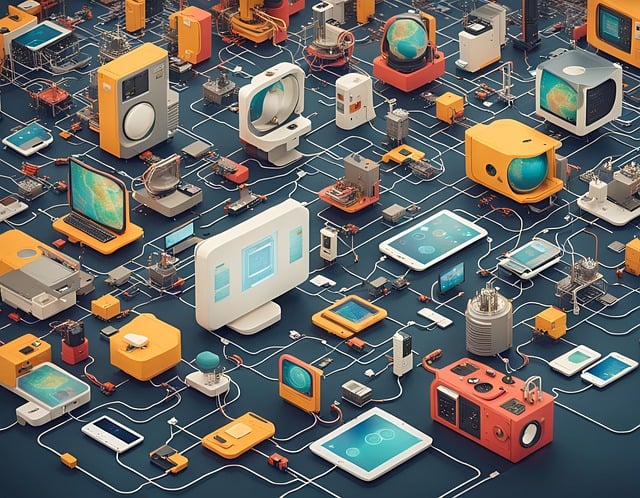Integrating AI into car repair processes offers significant advantages such as faster and more accurate diagnostics, efficient customer engagement through personalized scheduling and real-time updates, and predictive maintenance. Despite challenges like initial costs and data privacy concerns, businesses can leverage AI to optimize inventory management, reduce downtime, and deliver improved services. AI customer engagement strategies, including chatbots and CRM systems, enhance accessibility, target promotions, and build strong client loyalty, setting a new standard for auto repair service excellence.
In today’s digital era, car repair shops are exploring the potential of Artificial Intelligence (AI) to transform their operations. This article delves into the best practices for integrating AI in auto repair, focusing on enhanced customer experience and efficient management. We discuss the benefits and challenges of AI integration, highlighting strategies like AI-powered diagnostic tools, personalized engagement, and streamlined workflow automation. By adopting these AI customer engagement strategies, auto repair shops can stay competitive and elevate their services.
- Understanding AI Integration in Car Repair: Benefits and Challenges
- Enhancing Customer Experience with AI-Powered Engagement Strategies
- Implementing AI for Efficient Auto Repair Shop Management
Understanding AI Integration in Car Repair: Benefits and Challenges

Integrating AI into car repair processes offers a multitude of benefits, from streamlining operations to enhancing customer experience. AI can automate routine tasks like diagnostic scanning, providing faster and more accurate results. It enables auto repair shops to implement efficient AI-driven customer engagement strategies, such as personalized scheduling and real-time updates on service progress. By leveraging machine learning algorithms, these shops can predict common issues, optimize inventory management, and reduce downtime for both technicians and customers.
However, challenges exist when adopting AI in this sector. Data privacy and security concerns are paramount, as sensitive vehicle and customer information must be protected. Additionally, initial setup costs and the need for specialized skills can deter smaller repair shops. Training staff to use new AI tools effectively is crucial for successful integration. Overcoming these challenges ensures that auto repair businesses can harness the power of AI to deliver improved services and maintain competitive edge in the market.
Enhancing Customer Experience with AI-Powered Engagement Strategies

In today’s digital age, AI customer engagement strategies are transforming the way car repair shops interact with their clients. By implementing AI-powered tools, auto repair shops can significantly enhance the overall customer experience. Chatbots, for instance, can handle initial inquiries, providing quick and accurate information 24/7, which improves accessibility and convenience for customers. Natural Language Processing (NLP) enables these chatbots to understand complex queries related to car repairs, ensuring customers receive personalized responses tailored to their specific needs.
Moreover, AI-driven customer relationship management (CRM) systems allow repair shops to build comprehensive profiles of each client, tracking their service history and preferences. This data-driven approach enables shop staff to deliver more targeted communications, offer relevant promotions, and anticipate future maintenance needs. Such personalized engagement fosters customer loyalty and strengthens the bond between the shop and its clientele, setting a new standard for exceptional auto repair service.
Implementing AI for Efficient Auto Repair Shop Management

Implementing AI for Efficient Auto Repair Shop Management
In today’s digital era, AI customer engagement strategies for auto repair shops are transforming the way businesses operate. By leveraging artificial intelligence, repair shops can streamline their operations, enhance customer experience, and improve overall efficiency. AI-driven systems can automate routine tasks such as scheduling appointments, managing inventory, and providing diagnostics, allowing staff to focus on more complex repairs. This not only reduces human error but also accelerates service times, making customers happy.
Furthermore, AI can personalize interactions with customers by offering tailored recommendations based on vehicle history and past services. Chatbots and virtual assistants powered by AI can answer common queries promptly, improving customer engagement. By integrating these technologies, auto repair shops can create a seamless, modern experience that sets them apart from competitors, fostering customer loyalty and ultimately driving business growth.
Integrating AI into car repair processes offers significant advantages, from streamlining management tasks to enhancing customer experiences. By adopting AI-powered engagement strategies, auto repair shops can provide personalized interactions, quick service updates, and efficient communication. This not only improves customer satisfaction but also allows technicians to focus on complex repairs, ultimately benefiting both the business and its clients. Implementing these AI best practices ensures auto repair shops stay competitive in today’s digital age.
